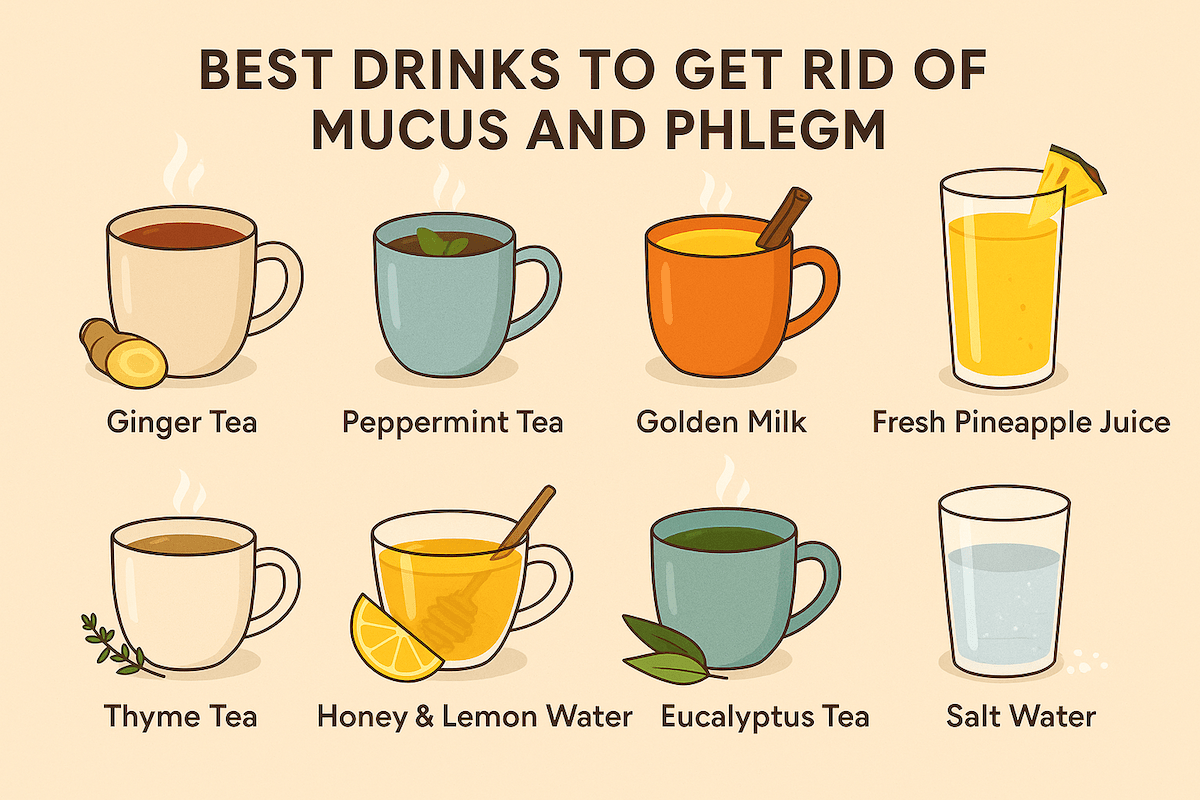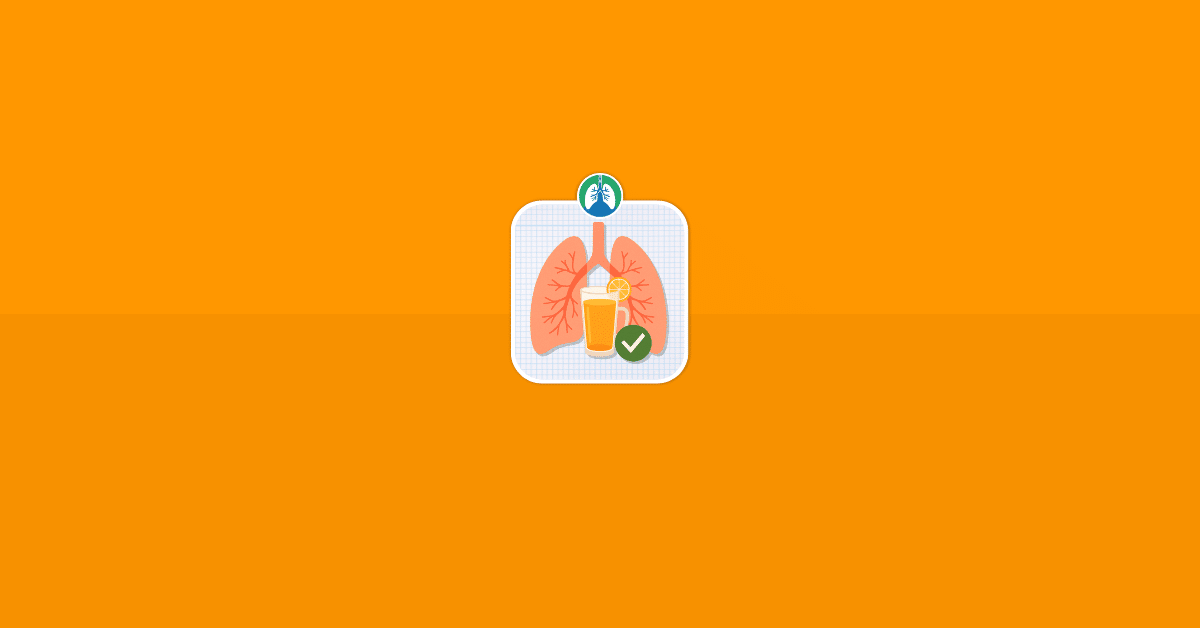When you’re battling a cold, allergies, sinus infection, or any kind of respiratory issue, mucus and phlegm can become your constant, unwelcome companions. That thick, sticky substance can clog your nasal passages, settle in your chest, irritate your throat, and make breathing more difficult. It’s the body’s natural defense mechanism, produced to trap irritants and pathogens, but too much of it can make you feel downright miserable.
The good news is that you don’t always need to rely on over-the-counter medications to find relief. In fact, some of the most effective remedies are found right in your kitchen.
This article, backed by science, breaks down the best drinks that can help loosen mucus, clear phlegm, soothe irritation, and support your respiratory system naturally.
Download our free guide that has over 100+ of the best tips for healthy lungs.
Why Hydration Is Essential
The foundation of any mucus-clearing routine is hydration. Staying hydrated is crucial for thinning mucus and helping it drain from your body more easily. When you’re dehydrated, your mucus becomes thicker and stickier, making it more difficult to clear from your sinuses, throat, and lungs.
Drinking plenty of fluids helps maintain the optimal viscosity of mucus so your body can expel it effectively. Room temperature or warm water is often the best option, especially for those sensitive to cold drinks, which can sometimes constrict the throat. Keeping your body well-hydrated helps reduce overall congestion and promotes respiratory comfort.

Healing Beverages That Clear Mucus
Watch this video and keep reading to learn more about the best drinks to help get rid of excess mucus and phlegm.
Healing Beverages That Clear Mucus
Watch this video and keep reading to learn more about the best drinks to help get rid of excess mucus and phlegm.
Ginger Tea
Ginger tea is one of the most powerful herbal drinks for relieving respiratory discomfort. Ginger contains gingerol and shogaol, two compounds with strong anti-inflammatory and antioxidant effects. These compounds can help soothe irritated airways, reduce swelling in the respiratory tract, and even support your immune system in fighting off infections.
Drinking ginger tea also improves circulation, which enhances your body’s ability to move mucus out of the lungs and sinuses. Adding a bit of honey and lemon to the tea not only improves the flavor but also enhances its benefits. Many people find relief when drinking ginger tea two to three times a day during illness or allergy flare-ups.
Peppermint Tea
Peppermint tea is known for its cooling and refreshing qualities, largely due to its menthol content. Menthol helps relax the muscles of the respiratory tract, making it easier to breathe and encouraging the expulsion of mucus. It also acts as a natural decongestant by opening up clogged nasal passages and breaking up chest congestion.
Inhaling the steam from a hot cup of peppermint tea can bring immediate relief, especially when you’re congested. The combination of soothing warmth and menthol can ease breathing and reduce irritation in the throat and lungs.
Golden Milk
Golden milk is a traditional drink made with turmeric, warm milk, black pepper, and often a touch of honey. The active compound in turmeric, curcumin, is a powerful anti-inflammatory and antimicrobial agent. Curcumin has been shown to reduce inflammation in the airways and support the immune response during respiratory infections.
This drink is especially helpful before bedtime, as it soothes the throat and promotes mucus drainage, allowing for more restful sleep. Golden milk is particularly effective for those with chronic conditions like asthma, bronchitis, or sinus inflammation.
Pineapple Juice
Pineapple juice contains bromelain, an enzyme with strong mucolytic and anti-inflammatory properties. Bromelain helps break down and dissolve thick mucus, making it easier to eliminate from the body. This can be especially helpful when mucus is stubbornly stuck in the throat or lungs.
Pineapple juice is also naturally sweet and easy to drink. Be sure to choose fresh, unsweetened juice, as added sugars can increase inflammation and worsen mucus production. A glass or two per day can provide noticeable relief when you’re feeling congested.
Thyme Tea
Thyme has long been used for its powerful medicinal properties. As a tea, it offers antiseptic, antibacterial, and expectorant benefits. Thyme tea works to loosen thick mucus, soothe inflamed airways, and reduce coughing. It’s especially effective for colds, bronchitis, and allergy-related congestion.
Thyme releases beneficial oils when steeped, which act directly on the respiratory tract. Drinking thyme tea throughout the day can ease discomfort and help the body clear phlegm more efficiently.
Honey and Lemon Water
This classic combination remains one of the simplest and most effective natural remedies. Lemon is rich in vitamin C and has natural astringent properties that help reduce mucus and inflammation. Honey is soothing and antibacterial, coating the throat and calming the cough reflex.
When mixed into warm water, these two ingredients create a comforting drink that hydrates, supports the immune system, and helps break up mucus. It’s an ideal drink to sip on in the morning and before bed.
Eucalyptus Tea
Eucalyptus is most commonly used in steam inhalation, but it can also be consumed as a tea. Eucalyptus leaves contain cineole, a compound known for its ability to break up mucus and relieve congestion. When brewed as a tea, eucalyptus delivers its benefits internally, helping to relax the airway muscles and reduce respiratory inflammation.
Because eucalyptus is potent, it’s important to drink this tea in moderation and consult a healthcare provider before using it regularly, especially for children or those with pre-existing conditions.
Echinacea Tea
Echinacea is widely recognized for its immune-boosting properties. While it doesn’t directly thin mucus, it helps your body combat the root causes of mucus buildup, particularly during respiratory infections. Drinking echinacea tea at the onset of cold symptoms can shorten their duration and reduce the severity of inflammation in the respiratory tract.
For people prone to frequent respiratory infections, echinacea tea can be a valuable addition to their seasonal routine.
Salt Water Gargle
Though not a drink in the traditional sense, salt water gargles are highly effective for clearing mucus in the throat. Gargling with warm salt water helps loosen thick mucus, reduce swelling, and flush out irritants like bacteria or viruses.
To prepare, dissolve a half teaspoon of salt in a cup of warm water. Gargle for 15 to 30 seconds, then spit it out. Doing this two or three times a day can offer rapid relief, especially if you’re experiencing postnasal drip or sore throat.
Drinks to Avoid
While certain drinks can provide relief, others can make mucus worse. Avoid beverages that are high in sugar, such as sodas and sweetened juices, as they can promote inflammation and make mucus thicker. Milkshakes and other dairy-heavy drinks may also contribute to increased phlegm in some individuals, although this varies from person to person.
Alcohol is another drink to limit or avoid during times of mucus buildup. It can dehydrate you and irritate the lining of the respiratory tract, making symptoms worse. Focus instead on hydration and anti-inflammatory choices that support healing.
Listen to Your Body
Mucus is not an illness but a symptom. It’s part of your body’s natural defense system. When mucus production increases, it’s usually in response to irritation, infection, or allergens. If your mucus becomes excessive, thick, discolored, or is accompanied by other symptoms such as fever, wheezing, or prolonged coughing, it’s time to seek medical attention.
The color of mucus can sometimes provide clues. Clear mucus is usually linked to allergies or normal body function. Yellow or green mucus may indicate an infection. Brown or blood-tinged mucus should always be evaluated by a healthcare provider.
Create a Daily Routine
Incorporating mucus-fighting drinks into your daily life can help you stay ahead of respiratory issues. Many people begin their mornings with warm lemon water, sip ginger or peppermint tea throughout the day, and enjoy golden milk or thyme tea before bed.
These routines can be calming and supportive, helping you stay hydrated and nourished while also keeping inflammation under control. Over time, they may contribute to fewer colds, reduced allergy symptoms, and better overall lung function.
Final Thoughts
Clearing mucus and phlegm doesn’t always require harsh medications. Nature provides us with many effective and comforting options to support respiratory health. From ginger tea and pineapple juice to golden milk and salt water gargles, these drinks can thin mucus, soothe the airways, and strengthen the immune system.
Building a routine with these beverages can help you manage symptoms during illness and support long-term respiratory wellness. The key is to stay hydrated, choose anti-inflammatory ingredients, and avoid triggers that worsen congestion. With the right habits and awareness, you can breathe easier and feel better, naturally.
If you found this article helpful, share it with someone who might benefit. Taking care of your lungs starts with simple, everyday choices. Stay hydrated, stay healthy, and support your body with nature’s best remedies.
Written by:
John Landry is a registered respiratory therapist from Memphis, TN, and has a bachelor's degree in kinesiology. He enjoys using evidence-based research to help others breathe easier and live a healthier life.
References
- Townsend EA, Siviski ME, Zhang Y, Xu C, Hoonjan B, Emala CW. Effects of ginger and its constituents on airway smooth muscle relaxation and calcium regulation. Am J Respir Cell Mol Biol. 2013.
- Eccles R. Menthol: effects on nasal sensation of airflow and the drive to breathe. Curr Allergy Asthma Rep. 2003.
- Zhu T, Chen Z, Chen G, Wang D, Tang S, Deng H, Wang J, Li S, Lan J, Tong J, Li H, Deng X, Zhang W, Sun J, Tu Y, Luo W, Li C. Curcumin Attenuates Asthmatic Airway Inflammation and Mucus Hypersecretion Involving a PPARγ-Dependent NF-κB Signaling Pathway In Vivo and In Vitro. Mediators Inflamm. 2019.
- Kemmerich B, Eberhardt R, Stammer H. Efficacy and tolerability of a fluid extract combination of thyme herb and ivy leaves and matched placebo in adults suffering from acute bronchitis with productive cough. A prospective, double-blind, placebo-controlled clinical trial. Arzneimittelforschung. 2006.
- Abuelgasim H, Albury C, Lee J. Effectiveness of honey for symptomatic relief in upper respiratory tract infections: a systematic review and meta-analysis. BMJ Evid Based Med. 2021.
- Sudhoff H, Klenke C, Greiner JF, Müller J, Brotzmann V, Ebmeyer J, Kaltschmidt B, Kaltschmidt C. 1,8-Cineol Reduces Mucus-Production in a Novel Human Ex Vivo Model of Late Rhinosinusitis. PLoS One. 2015.
- David S, Cunningham R. Echinacea for the prevention and treatment of upper respiratory tract infections: A systematic review and meta-analysis. Complement Ther Med. 2019.
- Satomura K, Kitamura T, Kawamura T, Shimbo T, Watanabe M, Kamei M, Takano Y, Tamakoshi A; Great Cold Investigators-I. Prevention of upper respiratory tract infections by gargling: a randomized trial. Am J Prev Med. 2005.
- Coelho Dos Reis JGA, Ferreira GM, Lourenço AA, Ribeiro ÁL, da Mata CPDSM, de Melo Oliveira P, Marques DPA, Ferreira LL, Clarindo FA, da Silva MF, Filho HPP, Oliveira NRR Jr, Sodré MMD, Gadelha SR, Albuquerque GR, Maciel BM, Mariano APM, Silva MM, Fontana R, Marin LJ, Carlos RSA, Lopes ATS, Ferreira FB, Dos Santos UR, Santana ÍTS, Fehlberg HF, Rezende RP, Dias JCT, Gross E, Goulart GAC, Santiago MG, de Lemos APML, da Conceição AO, Romano CC, de Carvalho LD, Martins Filho OA, Quadros CA, Morris DL, Valle SJ. Ex-vivo mucolytic and anti-inflammatory activity of BromAc in tracheal aspirates from COVID-19. Biomed Pharmacother. 2022.


